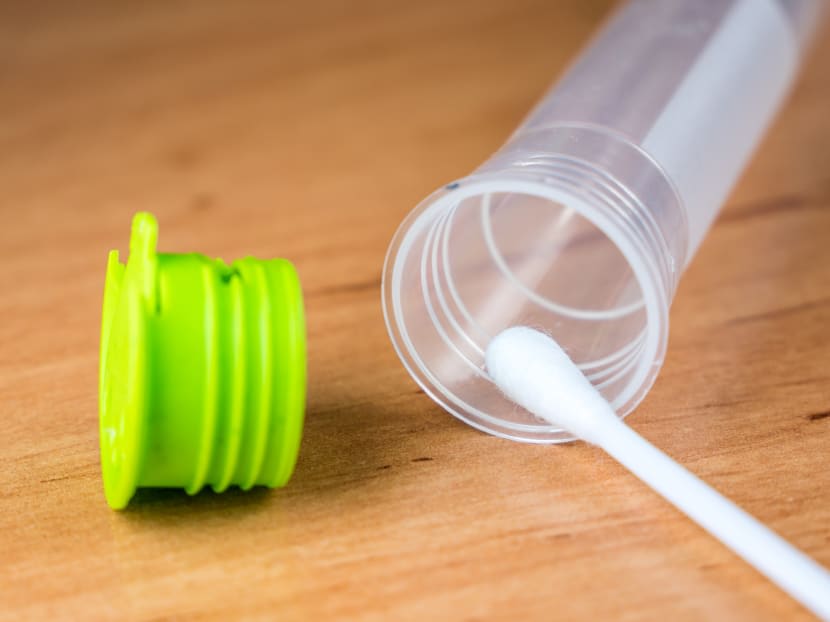HIV self-test kits to be available under national programme from Aug 1 as infections fall further
SINGAPORE — From Aug 1, self-test kits for human immunodeficiency virus (HIV) infections, that can be used at home, will be introduced in Singapore under a national programme tackling the disease.

- From Aug 1, self-test kits for HIV will be introduced in Singapore under a national programme
- They will cost between S$20 and S$32 and can be done at home
- The number of new HIV infections continued to fall, with 250 cases reported in 2021
SINGAPORE — From Aug 1, self-test kits for human immunodeficiency virus (HIV) infections, that can be used at home, will be introduced in Singapore under a national programme tackling the disease.
The Ministry of Health (MOH) and the National Centre for Infectious Diseases (NCID) announced the move on Friday (July 1) as they revealed that HIV infections here have continued to fall, with 250 cases reported among Singapore citizens and permanent residents last year.
From 2007 to 2017, the annual number of new HIV cases have ranged from 400 to 500. It fell to about 320 in 2018 and 2019, and dropped further to 261 in 2020.
The new test kits will cost between S$20 and S$32 and will be available at the Department of Sexually Transmitted Infections Control Clinic and Action for Aids Anonymous Test Site at 31 Kelantan Lane.
The test involves collecting an oral specimen with a swab and will take about 20 to 40 minutes to show results.
However, getting a positive result from a self-test is not enough to confirm a diagnosis. Those with a positive result should go to a healthcare provider for confirmatory testing and be referred for treatment if needed, MOH and NCID said in a joint statement.
Conversely, a negative result does not mean a person is not infected because it can take up to three months for the body to develop antibodies that can be detected by the self-test kits, they added.
“Those at higher risk of HIV infection should test more frequently and see a healthcare provider to discuss options for preventive measures and testing,” MOH and NCID said.
The test kits are being introduced by the National HIV Programme, which is established under NCID to coordinate the country’s response to the disease.
For now, HIV testing is widely available at healthcare institutions, including polyclinics, private clinics, hospitals and at anonymous HIV test sites where personal particulars are not required.
Although self-test kits for HIV have been advertised for sale by suppliers here for years, MOH and the Health Sciences Authority told CNA in 2018 that these suppliers are not licensed.
NCID states on its website that HIV self-testing is not yet an option in Singapore. TODAY has asked the authorities whether it has licensed any self-test kits since 2018.
MOST INFECTIONS WERE AMONG MEN
Of the 250 cases reported in 2021, the vast majority — 238 cases, or 95 per cent — were male, as was the case in past years. Those aged 20 to 49 accounted for 68 per cent of the infections among men.
Sexual intercourse remains the main mode of HIV transmission, making up 237 out of all 250 infections (95 per cent) in 2021. Of these:
- 82 were through heterosexual transmission
- 147 through gay sex transmission
- Eight through bisexual transmission
Of the remaining 13 cases, three were through intravenous drug use and 10 were recorded as “uncertain/others”.
More than half (57 per cent) of newly reported cases last year were detected during the course of medical care, including people who were or were not showing HIV-related symptoms.
Another 18 per cent were detected during routine HIV screening programmes and 16 per cent detected through self-initiated HIV screenings. The rest were detected through other forms of screening.
About 62 per cent of all cases had a late-stage infection when diagnosed.
As of the end of last year, 9,129 Singaporeans and permanent residents have been infected with HIV, of whom 2,255 have died over the years.
MOH and NCID strongly advised people who engage in sexual behaviour with a higher risk of infection, such as having multiple sexual partners or having casual or commercial sex, to use condoms to prevent HIV or other sexually transmissed infections.
Preventive measures such as HIV pre-exposure prophylaxis — medicine taken to reduce the risk of getting HIV — are also highly effective when used as part of a comprehensive HIV prevention strategy, they said.
People engaging in high-risk sexual behaviour should also go for regular HIV testing, they added.
Regular testing and early diagnosis will allow people living with HIV to be treated early, they said.
This will also help protect their partners from infection because those on treatment and with an undetectable viral load have practically no risk of transmitting the virus.
“With early and effective treatment, people living with HIV can lead lives no different from others,” they added.











